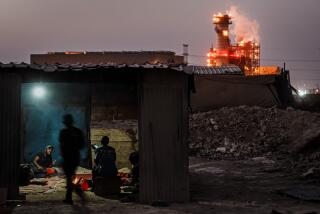Ethnic Discord : Tuareg Rebels See a Separate State in Sands of Mali : * Despite recent attacks on cities, this nomadic tribe of warriors is seen as being splintered, disorganized and lacking in focus.
TIMBUKTU, Mali — It may be true that the fortunes of this fabled city crested 600 years ago, but when its people try to explain its vacant look and forlorn condition today by talking about “the problems,” they are alluding to a more recent development:
The Tuaregs are restless.
Since the beginning of December, armed bands apparently drawn from this tribe of fierce nomadic raiders have attacked the city at least twice, killing 17 and shooting up the military governor’s residence and a local health center. The attacks are only the latest of more than 50 raids throughout the vast arid north of this country since June, 1990. More than 80 civilians have been killed, as well as several hundred raiders and government troops.
The rebels are splintered and politically disorganized--at least half a dozen groups have emerged. One diplomatic observer in the Malian capital of Bamako estimates there are 1,500 rebel fighters overall, with perhaps another 4,500 camp followers--this out of a Tuareg population totaling 300,000 to 400,000 of Mali’s 8.3 million people.
The rebels have never articulated a consistent set of concrete demands, other than the eye-catching but impractical goal of creating a separate Tuareg state in this forbidding region. The extent of their support among the Tuareg population is unclear.
It’s also true that in a featureless arid wasteland too vast to patrol, fine distinctions between organized rebellion and sheer banditry are hard to make. Some Tuareg leaders believe that only one-fourth of the recorded attacks have been by genuine rebels, the rest mounted by desperadoes taking advantage of the reigning disorder.
The resulting instability has been felt most sharply in Timbuktu. The tourists who had rediscovered this legendary oasis in the 1980s have once again disappeared; scarcely a single one has been seen in months. When townspeople who were enraged over the attacks last year pillaged shops owned by anyone light-skinned like the Tuaregs--including Arabs and Berbers--the shopkeepers fled west to Mauritania. For months, much of Timbuktu’s commercial district remained shuttered and closed.
The Tuareg revolt, which spills over into neighboring Niger, has many features characteristic of African unrest. It is rooted in the nomads’ inability to cope with modern change, in ancient ethnic animosities between them and the black Africans of the region and in the evaporating economic opportunities of the tribe’s habitat in the Sahel, the semi-arid “shore” on the edge of the Saharan desert sea.
Like many other African rebellions, it features young men in modern camouflage garb, toting automatic weapons around the desert in Toyota 4-wheel-drive vehicles, all in defense of a way of life whose traditions were established a thousand years ago in a very different environment.
One element it does not share with most other African rebellions is the determination of the current quasi-military Mali government--which overthrew dictator Gen. Moussa Traore last March and is planning to cede power to an elected president this spring--to settle the problem by negotiation rather than force.
The interim government is scheduled to sign the latest in a series of accords with the rebels on Thursday. It calls for a cease-fire and prisoner exchange, not unlike several similar deals previously ignored by both sides. Meanwhile, problems continue in Niger, where Tuareg rebels are holding 29 soldiers and police officers hostage.
Whatever the fate of the latest deal, the Tuareg revolt cannot be fully understood without a picture of the unique people at its center.
For centuries, particularly at the height of the trans-Saharan caravan trade, the Tuaregs were feared scourges of the Sahel, ranging in search of pasture throughout the north of Mali, into Niger and parts of Mauritania, Algeria and Libya.
Primarily nomadic herders, they often supplemented their income in the dry season by raiding the caravans or, alternatively, hiring out as guides and guards in what one historian has called a “massive protection racket.” Light-skinned like Arabs and speaking a Berber language called Tamashek, they kept black slaves for domestic work, shunned agriculture and traded for grain with the settled cultivators of the Niger River basin.
Several of the first Europeans to cross the desert in quest of the golden city of Timbuktu lost their lives or limbs to Tuareg raids. The survivors brought back romantic yarns about a fierce camel-riding tribe they called the “blue men” (for their indigo-tinted robes) or the “people of the veil” (for the way they swathed their faces in the tails of their flowing turbans).
In the 15th Century, European advances in marine navigation allowed traders to round the Western hump of Africa by sea and deal directly with people south of the Sahara. This eliminated the need for the 50-day caravan crossing of the desert. With Timbuktu in decline and the caravan business waning, one of the pillars of the Tuareg economy was kicked away.
Another was undermined when the French colonized what was once the Malian Empire and outlawed slavery (although it is widely admitted to exist still among some Tuareg clans).
By 1973, when the first of two devastating droughts struck the Sahel, the Tuaregs were the people least able to resist it. The toll was so great that a herdsman with 14,000 head of cattle might be left with 15. When the herds died off, the people had no other means of survival--no caravans to raid and no agricultural skills.
The droughts of 1973 and 1984-85 provoked an irreversible change in Tuareg life. While older Tuaregs came south to the cities to beg, the youths migrated north, joining Polisario rebels in Western Sahara and the Libyan army, which deployed them in Chad and Lebanon. They eventually returned home as trained modern fighters, armed with Kalashnikov rifles and grenade launchers.
The new weaponry raised the problem of Tuareg banditry to quite a different order from before. “It’s important to realize that there is a tradition of raiding among the Tuaregs,” said a Western student of the tribe. “In the past, a bandit raid might result in one or two deaths, which was not so serious. But with automatic weapons, now they would kill 10 or 20.”
Tuareg elders often argue that the tribe’s problems stem from the distaste of outsiders for their way of life and reputation--a reputation many feel is unfair.
“This view of the Tuaregs is the result of French malice,” said Amderi Ag Rissa, a Tuareg educator from the town of Gao. “They said we’re thieves, slavers, dirty, because they saw us as rebellious. The French thought we’d have to be settled or exterminated. Bandits? Every people has bandits. The Sahel is vast, and there we have chiefs, philosophers and, sure, bandits.”
Others argue that their aspirations as a group are no different from those of other Africans. “The Tuaregs want schools, better food, development,” said Nouri Mohamed Ali, a Tuareg teacher.
But to this day, many outsiders argue that the Tuaregs can only survive by leaving the life of nomadic herders in the Sahel and retreating to agricultural plots.
“The only viable solution, over time, is for the Tuaregs to cease being Tuaregs,” said a prominent Western diplomat in Bamako. Westerners and Malian leaders all agree that one indispensable element of that change is forcing Tuareg children into school.
As for increased development, the Sahel presents unique obstacles to modern change. Some theorists argue that even the scant increases in living standards brought to the Tuareg over the last 40 years were enough to throw the region’s delicate ecology out of balance.
Still, argues Major Saydou Traore, the military governor of this remote and fabled outpost: “The philosophers say it’s human nature to adapt. Even the animals adapt, and humans are obligated to change in order to survive.”
Desert Nomads Who are they: Fierce nomadic tribe of Northern Africa. For centuries, they were feared scourges of the Sahel. Primarily herders, they roamed Mali, Niger and parts of Mauritania, Algeria and Libya in search of pasture. In the dry season, however, they often turned to raiding caravans. The numbers: There are 300,000 to 400,000 Tuaregs in Mali. Of those, 1,500 are rebel fighters; another 4,500 are camp followers Groundwork for the rebellion: The droughts of 1973 and 1984-85 altered their way of life. While older Tuaregs turned to begging in the cities, youths joined Polisario rebels in Western Sahara and the Libyan army, which deployed them in Chad and Lebanon. They eventually came home as trained modern fighters. Their goal: To create a separate state The next step: Mali’s interim government on Thursday plans to sign the latest in a series of peace accords with the rebels.
More to Read
Sign up for Essential California
The most important California stories and recommendations in your inbox every morning.
You may occasionally receive promotional content from the Los Angeles Times.










